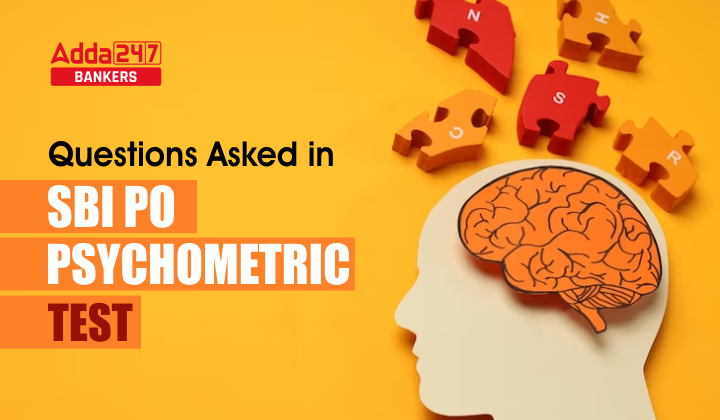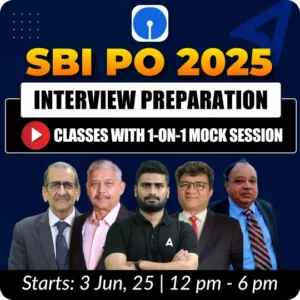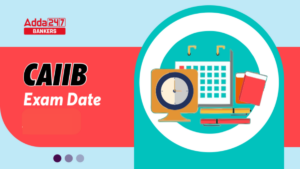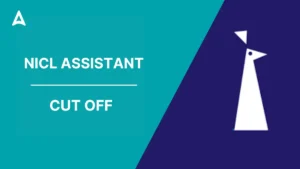For all aspiring Probationary Officers, the State Bank of India (SBI) has announced that the Psychometric Test for SBI PO 2025 is scheduled for 31 May 2025. This particular assessment is a crucial component of the SBI PO selection process. Unlike traditional written examinations that primarily test academic knowledge and problem-solving abilities, the Psychometric Test delves deeper, aiming to evaluate a candidate’s personality traits, behavioural competencies, and suitability for the demanding and dynamic role of a Probationary Officer within India’s largest public sector bank.
Questions Asked in SBI PO Psychometric Test
A psychometric test is a standardised assessment designed to measure an individual’s cognitive abilities and personality characteristics. In the context of recruitment, these tests help employers gain insights into a candidate’s potential for success in a specific job role, beyond what academic qualifications or interview performance alone might reveal.
Also Check, SBI PO Mains Result 2025
Candidates must check the questions asked in the SBI PO Psychometric test last year, which will help them to understand the pattern and expected questions for this year.
| SBI PO Psychometric Test Pattern | ||
| Sections | No. of Questions | Duration |
| Part A | 23 | 90 Minutes |
| Part B | 120 | |
| Part C | 10 | |
| Part D | 46 | |
| Overall | 199 | |
Part A consisted of 23 questions in which there were only 2 options, candidates had to choose the option that they thought was right.
Example: There was 1 question related to the opinion of the candidate whether luck plays an important role or it is just an outcome of the acts you did.
Part B, C, and D consisted of 5 options that were:
a) Agree
b) Strongly Agree
c) Disagree
d) Strongly Disagree
e) Neutral
- Most of the questions were based on the beliefs
- Behavioural Questions: These questions were asked to know about the behaviour of the candidates.
- Situational Judgement Questions: Situational Judgement Questions are the questions in which candidates have to take a stand on any of the acts presented in front of them.
- Personality Questions: Some questions were designed to acknowledge the personality of the candidate
- Emotional Intelligence Test
Types of Questions Asked in SBI PO Psychometric Test
The SBI PO Psychometric Test typically comprises two main categories of questions: Personality Questionnaires and Situational Judgement Tests. It’s important to note that this test is distinct from the aptitude tests (like numerical or verbal reasoning) that might be part of other stages, although sometimes these cognitive ability tests are also broadly categorized under “psychometric assessments.” For the SBI PO Psychometric Test, the focus is primarily on personality and behaviour.
1. Personality Questionnaires
These sections aim to map your personality traits against a set of competencies deemed essential for an SBI PO. There are no “right” or “wrong” answers in the traditional sense, but rather “preferred” responses that align with the desired job profile.
Format: Questions are usually presented as statements, and you are asked to rate your agreement or disagreement on a Likert scale (e.g., “Strongly Agree,” “Agree,” “Neutral,” “Disagree,” “Strongly Disagree”). Sometimes, you might be asked to choose which statement describes you “Most Like Me” or “Least Like Me” from a pair or group of statements.
Traits Assessed: These questions typically probe traits related to the “Big Five” personality dimensions:
- Conscientiousness: How organized, disciplined, and responsible you are. Example Statement: “I pay great attention to detail in my work.”
- Extraversion: How outgoing, sociable, and assertive you are. Example Statement: “I enjoy being the center of attention in a group.”
- Agreeableness: How cooperative, empathetic, and friendly you are. Example Statement: “I try to be considerate of others’ feelings.”
- Emotional Stability (Neuroticism): How calm, stable, and resilient you are under stress. Example Statement: “I tend to worry a lot about the future.” (A lower score on this indicates higher emotional stability)
- Openness to Experience: How imaginative, curious, and open to new ideas you are. Example Statement: “I am always open to trying new things and experiences.”
Strategy: The key here is consistency and honesty. While you might be tempted to answer what you think the bank wants to hear, psychometric tests often have built-in consistency checks. If your answers contradict each other, it can flag you as inconsistent or dishonest. Instead, reflect on your genuine behaviour and tendencies, keeping the demands of a banking role in mind (e.g., customer focus, integrity, ability to handle pressure).
2. Situational Judgement Tests (SJTs)
SJTs are designed to assess your judgment and decision-making skills in realistic workplace scenarios. They are highly effective in predicting how you might behave in situations relevant to the Probationary Officer role.
Format: You will be presented with a hypothetical situation or a short case study relevant to a banking environment. Following the scenario, you’ll be given several possible actions or responses. Your task is usually to:
- Choose the “Most Effective” and “Least Effective” action.
- Rank all the options from “Most Effective” to “Least Effective.”
- Rate the effectiveness of each option individually.
Skills Assessed: SJTs primarily evaluate:
- Problem-Solving: Your ability to analyze a situation and identify appropriate solutions.
- Decision-Making: How you weigh options and make choices under pressure.
- Interpersonal Skills: How you interact with colleagues, superiors, and customers.
- Customer Service Orientation: Your approach to handling customer queries, complaints, and needs.
- Ethics and Integrity: Your adherence to professional conduct and banking regulations.
- Stress Management: How you react and manage challenging situations.
Example Scenario:
Scenario: “You are assisting a customer with a complex transaction, and another customer approaches your counter, visibly frustrated and demanding immediate attention, stating they have been waiting for a long time.”
Possible Actions:
- A. Politely ask the second customer to wait as you are busy with another client.
- B. Quickly finish the current transaction, even if it means making a small error, to attend to the second customer.
- C. Acknowledge the second customer, assure them you will be with them shortly, and continue to focus on completing the first transaction accurately.
- D. Call a colleague to assist the second customer while you finish your current task.
- (In this example, Option C or D would likely be considered most effective, demonstrating professionalism and customer service, while Option B would be least effective due to potential error.)
Strategy: For SJTs, there are often “best” and “worst” answers based on banking values. Think about:
- Customer Focus: Always prioritise customer satisfaction while adhering to rules.
- Integrity and Ethics: Never compromise on honesty or compliance.
- Teamwork: Consider how your actions affect colleagues.
- Professionalism: Maintain composure and respectful communication.
- Problem-Solving: Look for practical and efficient solutions.
- Proactiveness: Take initiative where appropriate.
| Related Posts | |
| SBI PO Syllabus | SBI PO Salary |
| SBI PO Previous Year Question Papers | SBI PO Cut Off |
| What is Psychometric Test? | |




 CAIIB Exam Date 2026 Out for June & ...
CAIIB Exam Date 2026 Out for June & ...
 NICL Assistant Cut Off 2026, Check Previ...
NICL Assistant Cut Off 2026, Check Previ...
 RBI Issues Draft Guidelines on Forex Dea...
RBI Issues Draft Guidelines on Forex Dea...








